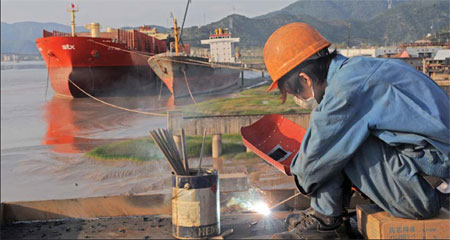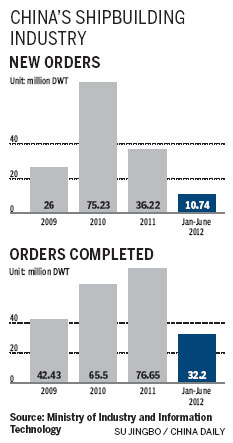
Ocean engineering could help some companies stay afloat
The specters of the global financial crisis and the European debt crisis still haunt shipbuilders in the Yangtze River Delta region, who have had no respite from economic choppiness since 2008.
According to the Ministry of Industry and Information Technology, Chinese shipbuilding companies received a total order of new ships amounting to some 10.74 million dead weight tons (DWT) in the first half of this year, down by 50.3 percent year-on-year.
The volume of handling orders was a mere 125.87 million DWT by the end of June, down 30.7 percent year-on-year, which can easily lead to the assumption that some shipbuilders will not be able to keep operating in the following months.
|
 A welder works at a shipbuilding plant in Taizhou, Zhejiang province. [Photo/China Daily] |
"We have not received any new orders. If the situation continues, we will have only one ship to build in the second half of this year," says Pan Haiwei, general manager of Wu Zhou Shipbuilding Industry Co Ltd in central Zhejiang.
The situation at Yueqing Jiangnan Shipbuilding Co Ltd of Wenzhou is even worse. Chairman Hu Guoqiang says no new orders have been received this year and the company now has no ships to build.
"What's worse, there are still several bulk carriers pending a sale. We are still trying our best to seek a buyer," Hu says.
Shipbuilders in neighboring Jiangsu province are also barely staying afloat.
Zhang Yuyong, executive deputy general manager of New Century Shipbuilding Corp in central Jiangsu, says the company had also not received any orders by August.
|
 |
"The orders we are handling now will be completed by April or May next year. But my prediction is that the shipbuilding market will not pick up until 2015," Zhang says.
"Meanwhile, the profits of shipbuilding are much reduced. An 80,000-ton bulk carrier, for example, was priced at $34 million (28 million euros) in 2010, but the price now is merely $23 million. That 30-percent profit is almost gone now," he says.
"Of course there are shipbuilders fighting for orders. But the profits are so small that it is like chewing bones for us. Private shipbuilding companies that have found trouble keeping their cash flow healthy definitely desire new orders. But for us, a private company that has been in operation for more than 10 years, we can make it even if we are out of any new orders."
New Century is taking a different approach to other shipbuilders; it is using this period to concentrate on new product research and development. One of their aims is to reduce energy use. A reduction in daily energy use from the current 130 tons to 60 tons would directly profit the company, Zhang says.
Although New Century is able to weather this difficult period with its previous years' earnings, it is still investing in property and giving out small loans to make more profits.
While shipbuilding companies have been having an extremely hard time since 2008, companies working on ocean-engineering projects have been doing well.
"The orders our company received in the first half of the year have risen significantly, especially for oil-extraction machines, largely due to the huge global demand for energy," says Liu Yufeng, deputy director of Wartsila China.
The Helsinki-headquartered company manufactures power sources for one in every three ships, and services one in two ships, sailing the world's seas.
"Many private companies have also marched into the ocean-engineering industry, for the oil and natural gas markets have been positive. For the low-end shipbuilding companies, the historic low in the shipping market will pose much threat to them. But for companies specializing in high-end ocean engineering, the lull means nothing," he says.
Shipbuilding industry struggles amid crisis
Shipbuilder seeks chance for overseas acquisition
Shipbuilding orders fall in H1
Half shipyards to go bankrupt
Shipbuilding industry grows slightly in Jan-May


 Washington to remain focused on Asia-Pacific
Washington to remain focused on Asia-Pacific RQFII target blue chips amid bear market
RQFII target blue chips amid bear market Australian recall for top two exporters
Australian recall for top two exporters China fears new car restrictions
China fears new car restrictions